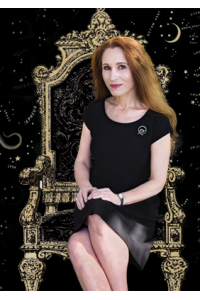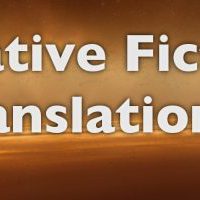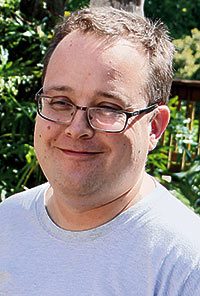Spotlight on: An Owomoyela, Writer and Editor
You write mythic and scientific fiction, but are best known for your inventive hard SF. Why does writing SF/fantasy in general, and hard SF in particular, appeal to you?
Part of it is history: I grew up on Star Trek, Redwall, and Fallout, and I’ve never grown out of those things. (Well, Brian Jacques passed away and I’m not that interested in Star Trek’s new direction, but I’m still enjoying the Fallout games.) So there’s a large component of ‘‘this is where I came from, and I owe these media a lot in terms of my own development.’’ But I think a larger part of speculative fiction’s appeal is that, no matter how far my mind wants to wander into hypotheticals or allegory, speculative fiction will accommodate that. Anything I can come up with, I can explore.
When it comes to hard SF, a lot of my interest is rooted in the fact that science is absolutely wonderful. Once you start catching glimpses of it, it’s hard not to let it capture your imagination and shake up your thinking patterns. I’ll frequently find articles that I have to share immediately with all my friends: try out ‘‘Scott and Scurvy’’ from Maciej Ceglowski’s blog Idle Words, on how the cure for scurvy was found, lost, and found again; or ‘‘Butter Pats and Battleships’’ on the Joe Pastry blog, about how a British inventor came up with a plan to make battleships out of ice and sawdust (and how this informs how we handle butter when making puff pastry and croissants); or ‘‘Things I Won’t Work With: Dioxygen Difluoride’’ on Derek Lowe’s blog In The Pipeline, concerning one of the most terrifying chemical compounds I’ve ever heard of. (That article also makes me want to adopt foof! as a curse word.)
So when I find bits of science that fascinate me, I start looking for ways to include them in my fiction. I still want to find a story that will let me fit in the transcendently eerie way Creole languages behave, and I’m toying with one that explores the fact that a majority of the mass in a tree comes not from soil nutrients or water, but from the carbon dioxide it takes in from the air. I’ve written stories about our bizarre and dysfunctional relationship to civic water supplies, and about human and computer understandings of patterns. For all that I like speculative fiction because it doesn’t confine my imaginings to the real world, I still believe that the real world has a wealth of wonder – and most of us barely scratch the surface.
You’ve got a background in computer science and linguistics. How do those influence your fiction?
I think, honestly, that they’re both symptomatic of a single underlying cause: I really love playing with systems. recently, I’ve started playing (on my own time) with how plot systems work, and how different mechanics produce different results. I’m not sure how much I’ve managed to learn, but trying to excavate what it is that makes a story work for me is always fun.
That affects the way in which I write. I have a very nonlinear style of composition; I’ll hop back and forth, write a bit of the middle, go write some setup, have a fantastic idea for the penultimate scene, and dart back and forth like the shuttle on a loom. This lets me come up with an idea for a third-act reveal and then jump back to the beginning to say, ‘‘Okay, I need some foreshadowing here,’’ or find an aspect of the ending and go back and add two precise thematic premonitions at strategic points. It’s organic, but also very systematic.
Of course, the fact that computer programming and linguistics are the systems I’ve played with the most does influence my fiction. I’m not a big fan of human-like AIs, for example, because humans and computers process things so differently, and computer ‘‘cognition’’ is so fantastically odd when viewed through the lens of human expectation – it’s much more interesting to me than artificial cognition which is functionally the same as human cognition.
And language is complex and amazing and something that, like intelligence, we don’t understand fully. One of these days, I’m going to find a plot and a cast of characters that will go along with my ‘‘language as a symbiotic, memetic organism’’ idea; until then, it exists in the back of my disconnected story seeds file.
Talk a bit about your work editing fiction for Strange Horizons. How did you get involved there, and what kind of stories do you look for?
I was still trying to crack Strange Horizons as a market when I got an invitation from the editorial team to apply for a position as editor. And that was a fantastic opportunity for me; I’d been thinking, for a while, that founding a magazine was a goal I wanted to work towards, and I’d never considered that editing an existing magazine was something within reach for me. I’m still a little flabbergasted when I think about it: people actually entrust me with this responsibility? But it’s been great fun.
There are a few things I always keep an eye out for, though a lot of the stories I’ve chosen have come from outside those areas of focus and just made me love them, regardless. And I wouldn’t trade that experience for a steady stream of only the things I’m looking for, so these examples shouldn’t be taken as prescriptive. But I always like seeing good xenofiction – nonhuman perspectives which are well rendered, well considered, and don’t reduce to cliché. I like seeing hard science fiction which maintains warmth and affection for its characters and the human condition. And I’m still holding out for a work of hyperfiction or interactive fiction which really lights me up.
It also always gives me a thrill to pick up a story from a new author, especially if we’re their first publication.
Any plans to write a novel?
I’ve written one, in fact! So now my plans include both writing novels and revising the one I’ve written. Coming from short stories, there’s still a lot I have to learn about novel structure, pacing, and scope – they’re all skills I haven’t internalized yet.
(I say this as though I have internalized how short-story mechanics work. Sometimes I wonder. It does feel like every time I start a new story, I go through an ‘‘Argh, how does writing work?’’ phase, but I’m given to believe that this is not all that uncommon among writers.)
What really interests me at the moment, though, is writing serials and works of episodic fiction, as well as writing stories of diverse lengths within expansive universes. The changing state of publishing means that a lot of interesting opportunities for storytelling are becoming more feasible, and a lot of those opportunities seem incredibly fun.
Is there anything else you’d like our readers to know about you or your work?
In the coming months, I hope to start playing a lot more with different distribution, funding, and interaction models. I have no intention of turning away from magazine submissions, but I want to explore platforms such as Patreon, activities such as prompt calls, and transformative-work-friendly copyleft paradigms through projects like my Shared Worlds stories. You can learn about some of these by poking around the web-original section of my website, and hopefully I’ll get significantly more information up about them soon.


 An (pronounce it ‘‘On’’) Owomoyela is a neutrois author with a background in web development, linguistics, and weaving chain maille out of stainless steel fencing wire, whose fiction has appeared in a number of venues including Clarkesworld, Asimov’s, Lightspeed, and a handful of year’s bests. An’s interests range from pulsars and Cepheid variables to gender studies and nonstandard pronouns, with a plethora of stops in-between. An can be found online at
An (pronounce it ‘‘On’’) Owomoyela is a neutrois author with a background in web development, linguistics, and weaving chain maille out of stainless steel fencing wire, whose fiction has appeared in a number of venues including Clarkesworld, Asimov’s, Lightspeed, and a handful of year’s bests. An’s interests range from pulsars and Cepheid variables to gender studies and nonstandard pronouns, with a plethora of stops in-between. An can be found online at 


